Kategorie: ‘Business Administration and Engineering’
Internship in Bilbao
- Business Administration and Engineering: Mechanical Engineering M.Sc.
- Spain, Bilbao
- FEV Consulting Iberia
- 10/23 – 02/24
Application/Finding an internship
I started the internship search for an internship in Spain very early (about 5 months before the start of the internship), as it is advisable to expect sufficient lead time for applications
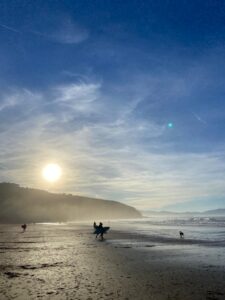
© Johann von Harling
Surfing beach in Sopelana
for internships abroad. I narrowed down the internship search to Spain because I am very interested in this country and also wanted to deepen my language skills. My approach to the application process involved systematically identifying companies in my area of specialization through internet research and searching for internship openings in the Career section of each website. Additionally, I also sent spontaneous applications to smaller companies. With larger companies, there is a greater likelihood that English is required or accepted as a working language. Many companies require foreign interns to complete the internship for longer than 6 months due to tax benefits, which limited my application to numerous companies. In the end, I found a German company with a location in Spain (Bilbao), which operates internationally in the field of technology consulting for the automotive industry and other technology sectors. I applied and had to go through the traditional application process for an internship in management consulting, consisting of two rounds of application involving interviews and solving a case.
Accomodation & Living expenses
For accommodation, I would recommend starting to look for apartments/rooms very early as well. Bilbao is one of the most expensive cities in Spain alongside Madrid and San Sebastian. Prices are generally comparable to those in German student cities, but they can also quickly rise to €600 or €700 for a shared room. However, it is also possible to find some very affordable rooms for around €300 with lower living standards.
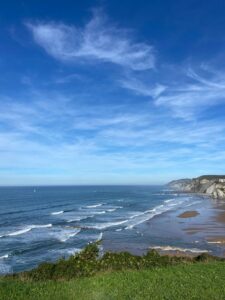
© Johann von Harling
Cost near by Bilbao
When viewing apartments, it is important to ensure that the windows are reasonably insulated for winter stays, and in summer, having air conditioning in the apartment may be necessary. When I arrived in Bilbao in October, the first few days were still very warm, with temperatures reaching up to 35°C. However, temperatures in winter also drop to very low values of around 0°C to 10°C, so having heating and well-insulated windows can contribute to comfort. Many students in Bilbao live in neighborhoods like Indautxu, Deusto, or Casco Viejo. However, there are apartments scattered throughout the city. Idealista is highly recommended as a portal for apartment hunting in Spain. Alternatively, you can also search for real estate agencies online. Bilbao is a relatively modern city for Spain, with many high buildings. On the other hand, it also has a beautiful old town area in Casco Viejo. The average living costs are quite comparable to the living costs in Germany although visits in restaurants and bars can be significantly cheaper from time to time. Prices in supermarkets are very much the same as in Germany, but the costs of a visit in bar or a restaurant can be regarding the restaurant a lot cheaper. It is also recognizable that Bilbao has one of the highest densities of Michelin Star restaurants in Spain and if you like you can as well try out the excellent cuisine.
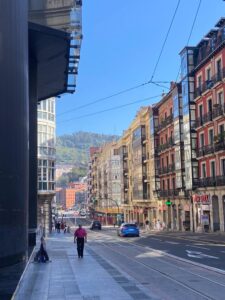
© Johann von Harling
Bilbao offering excellent transportation options with tram, metro, bus and train
Everyday life/ the internship
I completed the internship full-time, mainly in the office in downtown Bilbao. The atmosphere within the international team was very professional yet friendly outside of working hours. The predominant language in the company was English due to international projects. However, the conversation would also occasionally switch to Spanish or German, which I enjoyed and which contributed to improving my language skills in several languages. The internship involved working on technical projects, which were well-suited to the knowledge gained from studying industrial engineering. Projects in the field of electromobility, artificial intelligence, and general automotive production were the focus. The working hours for a consultancy were mostly between 8:30 am and 7:30 pm, which included most times a lunch break of half an hour to one hour, where we sat together with all the employees. Usually in the week most time was spent at the office and free time afterwards in walks around the various streets in the city and weekends were used to do bigger journeys and small trips within the near of Bilbao or other cites in Spain.
Free time/tips
Leisure time in Spain, especially in Bilbao, can be very diverse depending on the season. During the warm autumn days, trips for hiking, relaxing, swimming, and surfing along the coast of Bilbao are highly recommended. With the metro, you can reach the vicinity of the beach for €1.50 within 30 minutes and then reach it on foot after a short hike (15-20 minutes). The coastline consists of steep cliffs and long beaches. Additionally, you can also utilize the surrounding mountains near Bilbao on weekends for short hikes to get a view over the entire region. Bilbao is located in northern Spain, and there are many noteworthy cities nearby such as Santander, San Sebastian, Pamplona, Zaragoza, or even Madrid. The Cantabrian and Basque regions, in general, are highly recommended for excursions. A recommendation to create more leisure time during the internship is to strategically choose vacation days to have long weekends, allowing for short trips to more distant cities like Barcelona, etc.
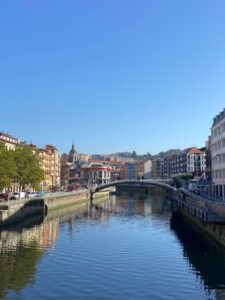
© Johann von Harling
Bilbao city quarters seperated by river
A recommendation for Bilbao is to explore the culinary diversity of Spanish specialties offered in many small local eateries. There is a rich culture of pintxos (tapas) available at many times of the day. Furthermore, Bilbao offers a lot of culture with the world-famous Guggenheim Museum or the football matches of the renowned Spanish football club Atletico Bilbao, which take place in the San Mames Stadium. I really enjoyed the internship because during that time, occasional team events were organized in which employees could participate, happening on weekends or after work. For example, there was the Bilbao Marathon, in which we could participate in various distances such as 10 km, half marathon, or marathon. During this race, the entire city was closed off for one evening, with about 13,000 people participating and many thousands more cheering on the streets of Bilbao.
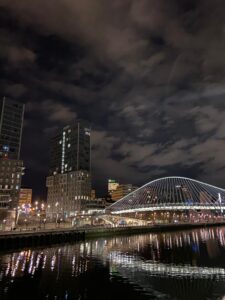
© Johann von Harling
Bilbao with modern buildings in the city center
Conclusion
An international internship is recommended for students who want to improve their language skills in a language other than their native language, are interested in new cultures, and at the same time want to experience the working style in another country within a company. Living abroad provides a different perspective on many things and broadens one’s horizons. The internship offers a very good opportunity to combine the interest in international experience with the interest in professional experience. In addition to the internship, you have the opportunity to explore new cities, different places, and another culture. Spaniards exude joy of life, which is recognizable in many everyday situations. Next to working, I really enjoyed the trips we organized either with working colleagues or with friends, where we could further explore the great cities and landscapes of Spain and discover even more how diverse this country is.
I am very glad, that I had this opportunity supported by Erasmus Internship, that offered me to experience the work culture as well as the live and culture in a different country. I hope that many people will also have this opportunity and support to experience such great possibilities.
Internship in Bilbao
- Business Administration and Engineering Mechanical Engineering M.Sc.
- Spain, Bilbao
- FEV Consulting Iberia
- 10/2023 – 01/2024
- Application/Finding an internship
Securing my Erasmus internship at FEV Consulting in Bilbao was a smooth process, given my already six-month experience as a working student at the company before applying. Informal discussions with my mentor paved the way, expressing my interest to the Bilbao office head during a professional reunion further gave me the opportunity.
Drawing from the experiences of previous German interns in the company, I tapped into an established network to gather insights and advice. What helped the process further was the early acceptance, granted six months before the start date. This provided enough time to plan and fulfill all Erasmus requirements, ensuring a well-prepared transition into this international experience.
- Accomodation & Living expenses
Securing accommodation in Bilbao proved to be a straightforward process. I aimed for a room in a recently established apartment, sharing the space with three others of working age. The monthly cost of the room was around 600€, exclusive of management and cleaning fees, alongside a one-month deposit.
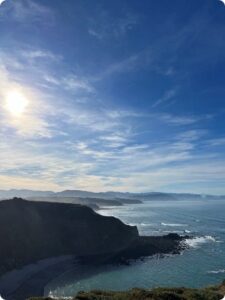
© Tom Benjamin Rummel
An advantageous aspect of my housing arrangement was the ability to review the apartment and complete the contractual formalities online prior to my arrival in Bilbao. This ensured a good transition before reaching my destination. Fortunately, my flatmates were predominantly Spanish speakers, affording me an ideal environment to practice and enhance my language skills within the rooms of my residence.
Financially, I received the Erasmus fee along with the minimum Spanish salary paid for my internship. In terms of living expenses, Bilbao’s cost of living equal my experiences in Aachen. But social outings are more economical, with soft drinks, beer, and wine averaging around 2€ per drink. Additionally, the culinary delights of the region (Pintxos, small tapas on bread) range from 2 to 3 euros per piece.
The public transportation system, particularly the metro, benefits from state subsidies, making it exceptionally affordable. A standard metro fare amounts to approximately 50 cents, contributing to the overall accessibility of transportation within the city.
- Everday life / the internship
Managing my everyday life during my Erasmus internship at FEV Consulting in Bilbao was a dynamic experience. Throughout the workweek, my days were filled with a good workload, leaving little time for activities beyond sports and cooking post-work.
While the option of working from home was available, it was relatively uncommon. I chose to commute to the office daily, a practice that proved to be beneficial. Leaving my laptop at the office made a clear separation between work and personal life, allowing me to disconnect at home without work-related considerations. This setup also provided flexibility for post-work engagements, as I carried no bag after work.
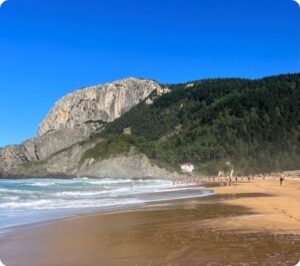
© Tom Benjamin Rummel
The standard working hours spanned from 8:30 to 18:30, including a long lunch break lasting an hour or sometimes even more. Colleagues, including myself, brought their own meals, creating a communal atmosphere during shared lunches and occasional ping pong matches.
Professionally, this period was pivotal as I undertook increased responsibilities within the company, starting with the management of my own small-scale project. English served as the primary working language, contributing to a cohesive and collaborative environment.
The office, characterized by an average age of around 28, has a cohesive and homogeneous team with shared interests. Social activities played a significant role, with a weekly soccer match against other local companies and Friday afternoons often concluding work a bit earlier. This allowed the team to go out into the lively streets of Bilbao, fostering the relations beyond the activities of the workplace.
- Free time/tips
Leveraging free time in Bilbao was an awesome exploration, as the city offered diverse options throughout the week, each drawing a varied crowd of locals spanning all age groups.
Going into different restaurants and locales became a personal priority whenever time allowed, though the city’s richness proved too big to conquer fully, even in its seemingly “small” boundaries.
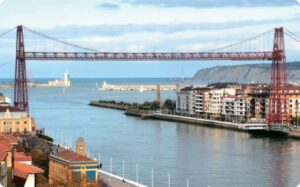
© Tom Benjamin Rummel
Three standout memories summarize my time in Spain. Foremost among them was the exploration of the seaside. The Atlantic coast unfolded a breathtaking panorama with expansive beaches, rough cliffs, and scenic paths for hikes or runs. The autumn weather allowed for enjoyable beach days, easily accessible within 30 minutes from the city center via the metro, costing just 50 cents. The surrounding regions revealed more treasures, showcasing diverse beaches and natural habitats.
On the opposite side of Bilbao lay the mountains, offering beautiful hikes with stunning views. Noteworthy expeditions included a 20 km hike to Gorbea in November and a spontaneous walk to Pagassari, a mountain right next to Bilbao. The accessibility of the countryside was evident as I strolled directly from my apartment, exemplifying the accessibility of nature next to urban living. Every favorable weekend weather was used by me to explore new surroundings, still leaving plenty of unexplored spots for future visits.
December presented an opportunity to make use of national holidays in Spain. A fellow intern and I used this chance to embark on a five-day adventure to Barcelona. The trip, undertaken by bus, a common mode of transportation in Spain, was a seven-hour journey.
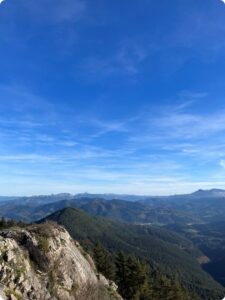
© Tom Benjamin Rummel
Barcelona welcomed us with pleasant weather and some Christmas markets, making the experience an unforgettable highlight of the whole season.
- Conclusion
Reflecting on my Erasmus internship at FEV Consulting in Bilbao, the experience surpassed my expectations in various ways. The seamless application process
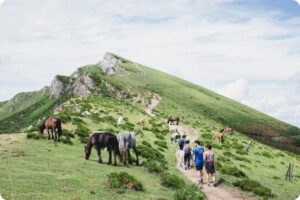
© Tom Benjamin Rummel
, coupled with the early acceptance, allowed me to embark on this adventure well-prepared and with anticipation. Living in Bilbao proved to be important for professional growth and personal enrichment. The daily routine, centered around a dynamic work environment, was complemented by the vibrant and diverse offerings of the city. The accommodating living situation, with engaging flat mates and reasonable living costs, added to the overall positive experience.
Professionally, the internship provided invaluable opportunities. From managing my first project to enhanced responsibilities, the exposure and guidance received significantly contributed to my professional development. The language-intensive work environment in English and the cohesive team dynamics created an atmosphere for learning and collaboration.
Beyond the workplace, Bilbao offered a rich diversity of experiences. Exploring the city’s culinary delights, embracing the natural beauty of the Atlantic coast and nearby mountains, and seizing opportunities for travel, particularly to Barcelona, added memorable dimensions to my time in Spain.
In conclusion, my Erasmus internship in Bilbao was a holistic journey encompassing professional growth, cultural immersion, and personal exploration. The memories stay, both within the workplace and beyond, will undoubtedly remain an important part of my academic and professional journey. As I look back, I am grateful for the experiences gained and the connections made, eagerly anticipating the chance of returning one day to continue the exploration of this region.
Research stay at the University of Oxford
- Business Administration and Engineering Mechanical Engineering M.Sc.
- United Kingdom, Oxford
- University of Oxford
- 04/2023 – 06/2023
Application/Finding an internship
During my master’s studies I developed an interest into various mathematical tools to model economic processes. Since I also wanted to take the chance to spend some more time abroad at the end of my studies, I decided to look for interesting chairs and institutes that align with my research interests to conduct my master thesis. Since the topic I was looking for was rather niche, there weren’t that many opportunities available and I quickly stumbled upon a research group at the University of Oxford after simple research on recent publicati
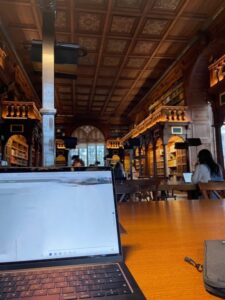
The reading room in the Old Bodleian Library.
© Jonas Schmänk
ons in my area of interest. With some background information on the coursework I have done previously and the research questions I was interested in, I reached out the administration of the institute. Luckily, two researchers reached out to me afterwards, stating that they have received my inquiry and would be happy to support the research for my thesis. After that, only some simple formalities had to be done for me to get an access card (“Bod card”) to the Universities’ libraries. I decided to physically stay in Oxford for the duration of one trimester (~2 months) since this didn’t require me to pay any fees to the University. This was a specific characteristic of the program of the receiving institute and does not necessarily hold true for other faculties as far as I know, so that should be kept in mind. The more “official” framework in which research stays in Oxford are processed through is the status of being a “recognised student”, which does require the payment of significant fees.
Accommodation & Living expenses
The University of Oxford consists of various colleges that typically provide for accommodation and food. Since I was a visitor to a specific institute and not a recognised student, it was unclear in the beginning whether I could make use of these services. Therefore, I decided to look for private accommodation. My receiving institute provided me with a short list of some possible opportunities and I decided to stay at the Commonwealth House, a well-located shared house affiliated with a local church at the rate of roughly 750 GBP a month including a simple but totally sufficient breakfast during weekdays in a common room with other tenants. While this seemed very pricey to me initially, this rate is more at the cheaper end in the center of Oxford and is similar to the ones that are paid for for college accommodation. Overall, I was content with the accommodation but for a prolonged period one might be better off with a different place, since the sanitary facilities and the kitchen were often in rather poor condition. As I found out later, often enough colleges do have some limited availability of rooms for non-members. To find out about that, a short email to the responsible person at the college is sufficient.
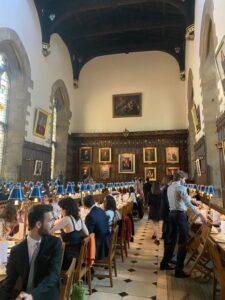
The dining hall at New College.
© Jonas Schmänk
As mentioned, breakfast was included most of the time at my accommodation. For lunch, one typically went to one of the very beautiful dining halls at the colleges, where a meal was available for between roughly 3.5-5 GBP. Groceries in the supermarket were available for a small premium compared to German prices. Overall, the ERASMUS scholarship made up for any additional expenses compared to my German student life.
Everyday life/ the internship
During my time in Oxford, I was highly flexible regarding my schedule. Typically, I started working at around 9:30 am and left at 17:30. While I had a work desk available at my institute, I often went to one of the beautiful old libraries Oxford has to offer. Since I worked on a rather programming-heavy task which didn’t require any other infrastructure than my laptop I was very flexible on where to work. Once a week, I met with my supervisors to discuss my progress and any open questions. Apart from the thesis-related tasks, I was able to join the seminars at my group, which included visits from various academics or presentations from group members regarding their current research.
Free time/tips
The possibility of activities outside of studying are almost overwhelming during term time. For once, there is probably a student society for any kind of interest. Let it be the Wine Society with frequent wine tastings, the Diplomatic Society with visits from international diplomats or the German Society with Germany-related pub quizzes, there are plenty of things to do. Furthermore, one should look out for associate memberships at one of the
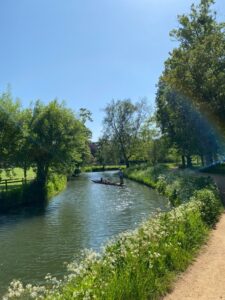
Punting through Christ Church Meadows.
© Jonas Schmänk
colleges if one is not affiliated with any of them as a regular or recognised student. The colleges offer further social activities, that are split between undergrads in the Junior Common Room (JCR) and grad students in the Middle Common Room (MCR). To find out about possibilities to join them as an associate member, one should look for the respective constitution by just googling a specific college + “MCR” [or JCR, depending on where you are in your studies] + “constitution”. Luckily, I had the chance to join New College as an associate member and therefore gained access to their activities as well, with the most noteworthy being the chance to attend their formal dinners. While these came at a cost of roughly 25 GBP, they provided a three-course meal of very high quality and the chance to mingle with other people and bring friends from other colleges. Typically, a suit or cocktail dress was obligatory for these dinners. Also, the colleges often have their own sports grounds where one can play tennis, squash or even rent a boat to go punting. The latter is something that is definitely to be done when in Oxford. The many canals and rivers provide a very scenic view on the city and the nature surrounding it. Furthermore, the University itself has a vast array of interesting talks and speeches by renowned academics which opens up further opportunities to spend free time on.
If one finds time for other things to do, Oxford also offers many nice museums, medieval colleges and pubs (my favorite being The Old Bookbinders) to explore during the day or in the evening. Also, the surroundings are worthwhile a visit. London is only a 1.5-hour bus ride away as well. I personally found it hard to find time for activities outside of Oxford during my limited time there, since the city itself has so much to offer.
Conclusion
Overall, I can highly recommend an academic stay in Oxford. Not only does the renowned university attract interesting and diverse people from all over the world, but the city also has a unique charm with its medieval colleges and libraries, creating an unparalleled atmosphere.
Internship in Antwerp
- Business Administration and Engineering: Mechanical Engineering M.Sc.
- Belgium, Antwerp
- Evonik Industries AG
- 03/2023 – 07/2023
1. Application/Finding an internship
The path to my internship led me though the Unitech program which I can very much recommend.
Because of that, I will explain the program here shortly. More information about it can be found under
unitech-international.org and via the RWTH where it is listed under the options to go abroad. It is a one
year long program for engineering students by the Unitech International Society which is a network of
European universities and partner companies. The program usually consists of an exchange semester in
fall/winter and an internship in spring which are joined by three weeks of additional activities in the
beginning, the middle and the end of the year. There, students meet, work on projects and are coached in
non-technical skills such team work or leadership. So overall, you are getting to know an even larger
group of people as well as making contacts into the professional world when compared to a normal
exchange. Additionally, it allows for an internship experience abroad, if you want. I am convinced that
without Unitech, my goal to do an internship abroad that fitted my study background and interests would
not have been possible in a comparable way. It created a platform to meet and discuss my goals and
interests with the participating companies to find the internship.
It is worth mentioning that (longer) internships are not that common in Belgium during the studies and
have to be confirmed by the regional government. This seems to ensure that students are not used as
cheap labor. The company needs to hand in an internship plan defining learning goals etc. This was
quickly assessed and accepted, so in my case no problem and I was supported well by the company.
2. Accomodation & Living expenses
The chemical industry cluster in the Port of Antwerp is one of the biggest in the world, stretching for the
city for around 30-40km up the river Scheldt to the Dutch border. The companies present there are
connected to the city by a bus system and dedicated lines for cycling. Antwerp is also beautiful and a
great place to live which played a role in convincing me to take on the internship. Thus, it made perfect
sense to search for accommodation in the city, which is also a student city and has a lot of housing
opportunities. Whether you are allowed to take a student housing as an intern depends on the
organization, but I found a place to stay this way and lived the months in a student room with a big shared
kitchen for the whole floor. It was a fairly new private building and living conditions where excellent. Prices
are higher than in Aachen, but I am confident in saying that something decent can easily be found for
500-600€ a month like in my case, with more time also below that.
Living expenses in Belgium are slightly higher than in Germany, although I spent my time there in an
inflationary period so that when coming back, I had to realise that prices were not same back home to
compare with. Especially food and stuff you would buy in dm or Rossmann I definitely found more
expensive and worth bringing from Germany from time to time and as far as possible.
In terms of taxes, insurance and other expenses, I can only say that as an EU citizen I was able to keep
the German insurance and paid a relatively small amount of income tax as a student. I have no
information on what general rules apply, just my specific case.
3. Everyday life/ the internship
First of all, Antwerp is not too far away from Aachen, within the EU and with a surprising high share of
German speakers, at least among the older generations. From that perspective, cultural differences are
surprisingly big and were in my view a very positive experience. I experienced people very open,
welcoming and very good in speaking English. French on the contrary is not as helpful and welcome as
Antwerp is in the Flemish speaking part and not in Wallonia. The differences like the language between
the different parts of Belgium (also the lack of understanding between Flemish speaking regions) where
very interesting to learn about.
I worked form 8:00 to 16:45 and took 30 mins by bus before and afterwards that was free and organized
by the industrial hub for commuting workers. Cycling is very popular in Antwerp and with summer
approaching, I also used my bike for the 17km commute along the river. This was not as beautiful as it
may sound, as the view is dominated by (petro-) chemical industry and container terminals, but
impressive and excellent in infrastructure for cycling. This goes for the whole city as well, as there is a
great well-balanced mixture of modes of transport. Cycling to work is also supported by a certain amount
of money depending on the distance. This would not have been necessary to motivate me, but indicates
the local will and need to get people away using from cars.
My work at one of the present chemical industry sites focused on how to achieve sustainable energy
supply, which very well suited my study background. There are mainly production sites of multi-national
corporations and it was very impressive as well as a bit intimidating to be part of the production of modern
Society’s needs for fuels, plastics, nutrition, fertilizers, care products and all other chemical products
concentrated in one area. I can recommend visiting not only to people with my specific focus on energy
engineering, as it shows the challenges that contradict the notion of just having to transition such an
existing infrastructure and ecosystem to climate neutrality quickly when ambition, will and the necessary
technical solutions are all there. I was allowed to support in projects with the goal to achieve this and it
gave me great insights how this is approached and how my acquired knowledge can be applied.
4. Free time/tips
I lived in a part of the city called Eilandje, which is in the North of the city and very recently modernized
and built around the old docks that are now too small for modern big ships and mainly used for leasure
boats. This means there is a lot of wide space around the water together with museums, bars and
restaurants as well as possibilities to spend free time. In contrast, in the central old town you find beautiful
streets and squares around the cathedral close to the river bank with the Market Square and even more
restaurants and bars. Between the two parts of the city, there are a lot of student homes and activities so
that this overall area is probably the best area to stay in Antwerp, although the South of the city is nice as
well.
Compared to other Western European cities, you will find most of what is a trend and successful brand in
other countries also present in Antwerp. Nevertheless, the restaurant and bar culture is more vibrant and
young people seem to be around a lot. Next to the opportunities the city itself has to offer, it is relatively
easy to get to Rotterdam and Amsterdam in the North as well as Brussels, Gent, Brugge or even Paris in
the South. Even though Antwerp has the second biggest port in Europe, it is still quite a bit to the coast
but it is probably no problem to go there as well.
5. Conclusion
All in all, I can recommend Unitech or any other path to an internship abroad, even if it is seemingly close
by like Belgium. Belgium to me is a very interesting and beautiful country I would never have discovered
in such a way and my stay allowed for numerous different perspectives and insights I would not want to
miss. I spent a great time and can recommend the country, the city of Antwerp and the idea to work or do
an internship there.
Writing my Master’s thesis in Paris
- Business Administration and Engineering: Mechanical Engineering M.Sc.
- France, Paris
- Neoen SA
- 10/2022 – 03/2023
I had the opportunity to write my external Master’s thesis at Neoen in Paris and had a very positive experience. I generally recommend gaining experience in a company, whether in your home country or abroad, just before the end of your studies, as it helped you better understand the sector and learn a lot. Neoen SA is a French company that operates in the renewable energy sector and was founded in 2008. The company is involved in the development, construction, and operation of wind, solar, and energy storage projects and is headquartered in Paris. With over 6 GW of renewable energy projects worldwide and a strong focus on sustainability and innovation, Neoen is a key player in the renewable energy sector.
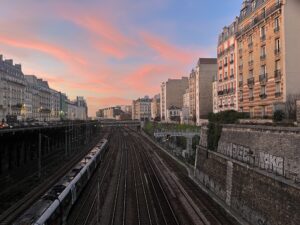
© Marie-Sophie Braun
It was much easier than I expected to find a PhD-student willing to be my responsible party from university side to supervise the thesis. None-the-less it remains a lot of extra work in terms of organization and also identification of a topic that will meet all the needs. Also, you do have to acknowledge that at some points, you will have to help out with non-thesis related tasks at the company: It will be a strong learning opportunity, but requires a lot of self-organization, especially in a foreign country.
The experience of living in France was particularly emotional for me because of a close connection to France from my childhood and family bounds. I thoroughly enjoyed the purely French environment and appreciated being able to speak the language in a work context. I do emphasize that a solid language level is a prerequisite for most of the French work environments. Even if the official language in companies could be English, I guess you could be the odd-one-out if you are the only person in the company not speaking the countries language and while it would be a problem for work-related topics, it might be difficult for a chat at the coffee machine.
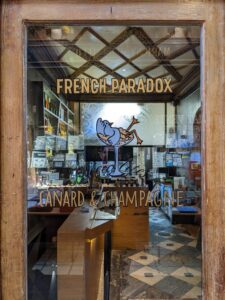
© Marie-Sophie Braun
The parisian work environment is very chic and neat. Jeans or sneaker were not seen. Guys weren’t allowed to wear polo’s at work and this will go without saying. Good clothing and good food are important in France in gereneral, I assume: This includes long breaks for lunch and an additional espresso after the meal. Even though, people are very chic, everyone was very friendly and open-minded.
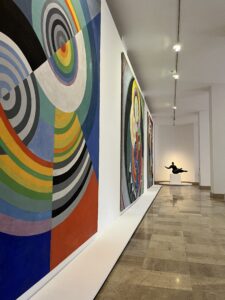
© Marie-Sophie Braun
I lived in Batignolles, in the 17th arrondissement and fell in love with the part of the city. It is a very nice, safe and friendly neigboorhood. Additionnally, I was able to get everywhere quickly by bike, which is the best means of transportation in Paris. I also recommend cultural centers (tiers lieux) and state museums, which are free for people under 26.The night life in Paris is very dense and differentiated. Depending on where you go it will be different. Less touristic parts of the city can be found for example in the 11th or 12th arrondissement and also, you should watch the sunset from the top of the parc de Belleville there. People more often meet outside then inside because appartments are small and the French terrasse-culture is very strong. In all seasons, you will find people outside and in a good mood.
In conclusion, I strongly recommend to anyone who speaks good French the opportunity to write their Master’s thesis in Paris. I had only had the best emotions. Although Paris is not a cheap city, I was able to pay the rent with the company’s expense allowance and overall had a very positive experience.
Consulting internship in Vienna
- Electrical Engineering and Business Administration M.Sc.
- Austria, Vienna
- Capgemini Consulting Österreich
- 10/2022 – 02/2023
Motivation and formalities: Before writing my thesis, I wanted to take the chance to get to know another business sector and to experience what it’s like to live in the beautiful city of Vienna. Therefore, I applied for a consulting internship at Capgemini Invent. The application process was very quick and the colleagues I met in the process gave me a very good impression of the work culture and lifestyle in consulting. Since I am not European, I needed a work visa, which is theoretically easy to get if you do an Erasmus internship. Unfortunately, the administrative department of the company had no experience with Erasmus interns, so I had to do a lot of research and contact many institutions.
Preparation: I started preparing four months before the start of my internship, and the time was just enough. In my case, the most difficult part was getting the work permit, but in general I would say that after accepting the internship offer, the only thing you have to prepare is the accommodation. I looked for a shared apartment in WG-Gesuch because I didn’t know many people in Vienna. I was very lucky to find a very friendly, open and helpful flatmate. The apartment was very modern and spacious and was located in the 16th district and very well connected to the office, but also to the city center and only 10-15 minutes away from my favorite cafes and bars in the 7th district. To get there, I took the night train from Aachen to Wien Meidling Bahnhof (and then the subway to the apartment) 10 days before my first day of work, so I could settle in well in Vienna. I can only recommend this, because during this time I was able to enjoy the warm September days, take care of some organizational things, get to know my flatmate better and meet people who are now very good friends of mine.
- Internship Search: I found the internship through LinkedIn and didn’t apply to anyone else because they got back to me very quickly and made a very good first impression.
- Apartment search: Via WG-Gesucht. I would 100% recommend a WG. I have also heard of other search portals like housing anywhere or willhaben. There are also accommodations in the STUWO dorms and many private and very modern student apartments.
- Phone or bank/account opening: Was not needed.
Formalities on site:
- Health insurance: My colleagues and I were automatically insured by ÖGK. For the insurance card, I had to submit a photo and it was delivered to my apartment. I then went to the general practitioner with the card. That worked very well.
- Everyone has to register their address and also deregister when they move out.
Everyday life/leisure: The five months in Vienna were a wonderful experience. Since I arrived at the end of September, I was able to do some wine hikes at Wilhelmina Berg, Kahlenberg and Nussberg. As well as a grills and chillings by the Danube. In the colder months my friends and I spend time in various museums (recommend the long night of museums; Mumok, Albertina, Albertina Modern, Leopold and the Kunsthistorisches Museum), bars (Monami, Café Anno, Prosecco Bar, Liebling), cafes (Ramasuri, Wirr, Ulrich & Erich), exhibitions, small concerts, pop up vintage stores and the Naschmarkt.
I can also recommend a visit to the ballet, the opera, a musical and a Christmas concert. During the Christmas season, there is a Christmas market on almost every corner. My favorite is the one at Spittelberg, but the Christmas market at Spittelberg and the one at Schönbrunn are also worth a visit or two. You also have to keep in mind that during the week I could only go out for dinner or drinks because I worked around 50 hours a week, but on the weekends I could enjoy everything Vienna has to offer. As for sports, my flatmate, some friends and I were members of “myClubs” (like Urban Sports in Germany) and could visit many different studios in the city. Another option is to sign up for university sports classes (USI).
- Going Out: There are many cheap and also fancy bars around Schwedensplatz and also in the 6th, 7th and 8th district. My favorites are the ones mentioned above. For live music, there are many bars on the “Gürtel”. For partying, my favorite clubs are Grelle Forelle (mostly techno) and Volksgarten (eclectic and mostly commercial music), but there are many others (Pratersauna, Praterdom, O Club, VIP, etc.). I’ve been to Vienna in the colder months, but I’ve heard there are lots of raves and outdoor parties in the summer.
- Culture shock: Only positive things! My flatmate was very welcoming and introduced me to her friends. At work, everyone was also very friendly and we did many activities together outside of the office. There were many new young co-workers like me, so it developed into a nice friendship. At a salsa night, I met some Erasmus students with whom we explored the city together and created unforgettable memories. I hope to see them again soon!
Experience Report on my Erasmus+ Traineeship at Bentley Motors in Quality Planning in Crewe, UK
- Business Administration and Engineering: Mechanical Engineering M.Sc.
- United Kingdom, Crewe
- Bentley Motors Ltd
- 08/2022 – 03/2023
I. Setup and visa
Where to begin…
This was probably the most nerve-wracking part of the entire Erasmus experience. I had my job interview in January 2022 while I was still on my internship with Porsche. During the interview I asked my interviewer and my future line-manager: “Well I really appreciate the chance to interview for the position, but do you know how we will deal with the visa requirements for the role?” to which he replied “If we decide to go with you as a candidate I will offer you all the support I can and if there is a will there is always a way”. Reason for asking this was obviously the Brexit which means that for all academic and job purposes a visa is required.
At the time of writing this there were two main visa routes to do an internship in the UK: The “GAE” visa and the “Skilled Worker Visa”. Unfortunately due to the high cost associated the latter was not an option. The Erasmus Programme generation until 2021 was a government approved exchange scheme eligible for a “GAE” visa which meant this was the only visa route I was able to take. This is why my internship was carried out as an Erasmus Placement. The subsequent Erasmus program generation is not eligible for this visa unfortunately.
You may think now “but why can you be an Erasmus student from the 2021 generation in 2023?”. The reason for that was that which generation you belong to is dependent on where the funding of the scholarship comes from. So the RWTH provided me the scholarship for an Erasmus Exchange from the budget of the 2021 program generation so I could actually get a UK visa for my placement. This method unfortunately ends working in May 2023 which is the end of the grace period given by the UK government.
For everybody trying to undertake an internship in the UK I heavily suggest getting in touch with the international office to explore options that are right for you. There is a list of government authorized exchange schemes for the UK on the gov.uk website. When you are in touch with a company you want to intern with, check if they have a contract in place with a company such as “Tier5Intern” or “ASGVisa” who offer authorized exchange schemes for foreign students. Plan at least 4 months (ideally 6) to deal with all the paperwork, errands and research required to make it happen.
It is a difficult path to be honest, but my line-manager was right with what he said to me during the interview. Best advice I can give on this matter is to stay persistent and encourage on-going communication between the international office, your company’s HR department, yourself and your manager.
II. Bentley Motors and the Quality Management role
Bentley Motors is a luxury car manufacturer based in Crewe, UK, known for producing high-end cars. The company has recently embraced new technologies and has focused on expanding its product range to include SUVs and electric vehicles. Bentley’s new strategy, called Beyond100, aims to become a global leader in sustainable luxury mobility, with a goal to become a fully electric brand by 2030 and to reduce its carbon footprint by 75% over the next decade. Key competitors include other luxury car brands such as Rolls-Royce, Aston Martin, Jaguar Land Rover, and Porsche.
As already mentioned, my placement was within the Quality Planning department. For me this role helped me expand my horizons in terms of work dynamic first and foremost. Because my previous role was production oriented, I was often pre-occupied with “firefighting” and dealing with new topics that came up adhoc. In my new team at Bentley the dynamic is very different. The quality planning department is split into two main branches. The first one is managing part approval and part maturation for new vehicle projects. The second branch primarily manages quality topics in the concept stage of a new vehicle project. Thus the work was overall more about looking ahead focusing on proactive quality management. That is why the placement helped broaden my horizon not just in terms of factual knowledge but also different workplace dynamics.
My placement project revolved around (re-)defining and writing the departments project deliverables in-line with Bentley’s new vehicle project management framework (in short PEP: “Product Emergence Process”). For this I held workshops with the relevant stakeholders to define who in the department is responsible for each activity within a certain process and then defining that process on a high level. This may sound tedious on the surface, but it was quite important since the department is measured against these deliverables as a vehicle project progresses. As part of this project I was able to improve my own project management, presentation and influencing skills.
Alongside this project I was also able to spend time in both sub departments because I made point to learn about the PEP-deliverables before attempting to define them. Thus I took part in various competitor benchmarking events, vehicle design assessments, went on supplier visits, took part in ergonomic studies, conducted maturity level assessments and of course, also spent some time with the product. In addition I got to learn about other functions such as our internal laboratory, production, product audit and the sourcing process in general.
One thing that stuck out to me is the difference in working culture between the UK and Germany. In my previous internship I found the company hierarchy to be quite steep for example. At Bentley the hierarchies are relatively flat compared to other Volkswagen group companies from what I can tell. I have also found that your formal education or position has a smaller impact on the way people treat you. In general people seem to give you responsibility and tasks purely based on your own ability which I find very positive. A lot of the people I got to meet had more varied work experiences compared to what I knew in Germany. Some of them have been in the military and then worked on the line before becoming quality engineers for example. Also there is a very large focus on upskilling in the job. So a lot of people I met worked their way into the position they are in organically, whereas in Germany people in similar roles all have B.Sc.’s and M.Sc.’s.
One thing I also quite enjoy is the “banter”. In Germany most people are very straight to the point and often quite serious. Contrary in England people tend “dance around” certain topics especially if they have a request. For example it is quite customary to have a short chat before getting to the actual point. Also people are more open to make a joke here and there to lighten the mood even at work (within reason). At first, I had to get used to these things a bit, but I find it makes day to day work much more enjoyable.
III. Experience in Crewe, UK
Bentley Motors is based in Crewe which is in Cheshire. I choose to live in Crewe during my placement year because I wanted to make sure I am close to my place of work. The reason being that even though Bentley has a flexible working system, I wanted to make the most of my time and be in the office as much as possible.
Crewe has both its good and bad aspects. I don’t want to sugarcoat it: there are probably more bad aspects than good. While it has a rich industrial history, the town has struggled with economic decline in recent years. As a result, the town may not be considered the nicest place to live by some. That said, living in Crewe is affordable, and it offers access to transportation links, making it a good base for exploring other parts of the UK and getting away from Crewe. For example it is easy to get to metropolitan areas such as Manchester, Liverpool, and London. If you are more in the countryside, it is also possible to get to Wales and various national parks such as the peak district from Crewe. Also most of the other industrial placement students lived in Crewe as well which meant it was good for my social life to not live in a prettier city nearby (for example Nantwich).
IV. Conclusion
Even though the process of getting the visa was cumbersome, the experience during the placement made it all the more worth to go through the effort. I got to meet a lot of interesting people both on and off the job from which I learnt a lot. Also I found that I quite like living in Britain in general and enjoy the culture.
In fact I enjoyed it so much I applied for a permanent position in the department I had my placement in. So with the end of my placement I started a new position in the role of “Senior Engineer – Product Quality” and ended up not returning to Germany to do my M.Sc. at the RWTH.
If that doesn’t speak volumes about how much I can recommend to anyone to undertake a similar work experience, then I don’t know what does.
V. Recommendations
In the last part of this report I would like to give some useful tips to anybody moving to the UK.
- To get paid you need a UK bank account: For this I can recommend “Wise” since you can open an account while you are still in Germany.
- For finding accommodation I can recommend the platform “SpareRoom” (for house shares) as well as Zoopla and Rightmove
- If you move into a house share a lot of them are “HMO’s”. This means they are not managed by a private group of people but a company. Thus don’t be surprised if you don’t get to meet your roommates before moving in. I recommend getting a property with a low minimum tenancy length so you can move relatively soon if you don’t like your accommodation or meet other people you would rather live with.
- Make sure to get a UK phone number as soon as possible. It will make your life much easier down the line. For a monthly contract I can recommend Smarty as a provider. Overall mobile contracts are much better and cheaper than in Germany.
- If you company offers a pension scheme, get on it asap and keep the related documents in a safe place. In essence this is the company giving you free money to invest for your retirement. All the returns from this are tax-free for life. Over the course of your placement this could add up to well over a thousand dollars from which you only invested a few hundred pounds of your own money.
Highly recommendable internship in Liechtenstein
- Business Administration and Engineering: Mechanical Engineering M.Sc.
- Liechtenstein, Schaan
- Hilti AG
- 10/2022 – 03/2023
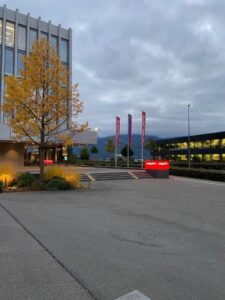
© Phil Brune
Hilti AG is a multinational company that specializes in manufacturing and supplying construction tools, systems, and services. It is committed to sustainability and social responsibility and is known for its high-quality products and innovation in the industry.
Preparation:
After I received my acceptance for the internship in Liechtenstein, I immediately started looking for an apartment. Immediately it became clear that it is not allowed to live in the country itself. So, you must decide whether you want to live in Switzerland or in Austria near the border to Liechtenstein. Clear recommendation: Feldkirch in Austria. Pretty much all interns live there, and it is a very nice old town.
Unfortunately, I was quite unlucky with my first apartment. One of my roommates was very unpleasant. That’s why my advice is to find out exactly where you’re moving to and which landlord you have. Without naming names, I can advise against a few.
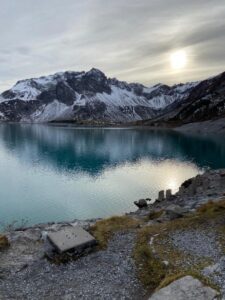
© Phil Brune
Daily life/Going out:
Before I moved to Feldkirch, I was worried that due to the size of the city (approx. 30,000 inhabitants) there would hardly be anything going on at the weekend. This fear was to prove unjustified very quickly. Feldkirch is a very lively and up-and-coming city. The high percentage of young people and the many bars and dance clubs made me feel at home right away.
Every Thursday, Hilti organizes an “Interns Dinner” for 30 interns in different restaurants. This way you meet new people every week and can expand your international network and make new friends. So you have a direct connection when you start new at Hilti.
Due to Feldkirch’s perfect location, in my opinion, there is plenty to do on the weekends, both in summer and winter. Especially if you’re into outdoor activities, you’ll love it. From hiking and biking to skiing and sledding, there is something for everyone. It’s a stone’s throw to Switzerland and Italy isn’t far either. Together with a few interns, we were in Bern, Zurich, Innsbruck, Turin and Milan, for example.
Work at Hilti AG:
Hilti has its headquarters in Liechtenstein. Both the first production facility (Plant 1) and some business units are located there. The working environment is
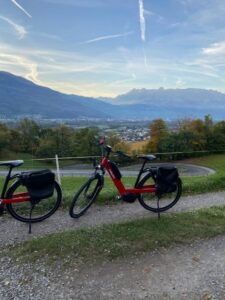
© Phil Brune
very international. I was able to expand my network a lot during the internship. There are about 80 interns working there, all of whom come from all over the world. For example, I was able to improve my English a lot.
Overall, the working atmosphere at Hilti is very pleasant and I can highly recommend the company. And the pay is excellent, by the way.
All in all I can highly recommend to do an internship there.
My internship in Bilbao
- Business Administration and Engineering M.Sc. Mechanical Engineering
- Spain, Bilbao
- FEV Iberia SI
- 10.10.2022-15.01.2023
Preparation:
When it comes to preparing for a stay in Bilbao, the most important thing is housing. In general, finding a place to live in Bilbao is not as stressful as in other cities. The best place to look for housing is “idealista”, a Spanish online real-estate marketplace. Prices obviously differ, but finding adequate housing for around 500 Euro/month is possible. Especially, when you can communicate in Spanish and also stay for at least half a year. Also, there are Erasmus Telegram and Whatsapp groups (you can find them on Instagram or in the Internet) where rooms are offered as well. Besides to look for housing, this is also a great way to make first contacts in the city. Another important preparation would be to look for health insurance. I had the luck that it was organized by the company.
Finding an internship:
In my case, I was a working student in the Aachen Office of the company I then worked for in Bilbao. Generally, going for an international company is the easiest way to find an internship abroad and that’s also how most people I talked to did it. Especially, when you are not fluent in Spanish, a regular local company will be tough to convince to take you.
Culture:
Most people have been to parts of Spain before, so I guess a Culture shock is not to be expected in
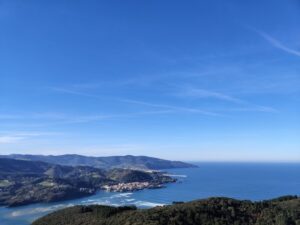
© Lukas Tacke Genannt Unterberg
that case. However, Bilbao is part of the former Basque-county. Even if it is technically Spain, the people are often quite proud of their heritage. Some might take it as an insult, if you call them Spaniards. Additionally, the Basque language is very prominent. You will hear it on the streets and read it a lot on signs. It is very different from Spanish, so don’t be fooled thinking it is just some form of dialect you might be able to understand! All in all I must say, people were very welcoming and most of the time happy to help and communicate, even if there isn’t actually a common language between you. The level of English capabilities is very low in that area, so basics in Spanish or Basque can be very helpful.
Day to day life:
Coming from the culture, food plays a very significant role there. Pintxos (A slice of bread with ANY savory toping you can think of) might be the most prominent one. You can take them for lunch or in the evening with some drinks. Since the city is next to the ocean, fish and other seafoods are integrated in a lot of dishes. If you are a vegetarian or a vegan, it might be hard for you. In more traditional restaurants the vegetarian dish is just a salad or something along that line, so you might want to go to more modern places.
When it comes to going out in the night, Bilbao has a lot to offer. Especially in the casco Viejo (old town) the bar density is very high. But also throughout other parts of the city, you will always find a nice place to grab a beer or a Kalimotxo (popular Basque drink, red wine with cola) and some Pintxos. The club landscape is definitely more restricted. For most clubs, you have to love reggeaton, since it will be played the whole night. But there are also some clubs, where the music choices are more diverse (strong recommend for “Sala Sonora” for Saturdays).
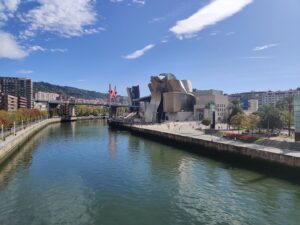
© Lukas Tacke Genannt Unterberg
Public transport is ridiculously cheap and easy in Bilbao. You go to any bigger metro station and buy a “Barik Card”, on which you then can load money. From then on, you just touch-and-go for trains, buses and the metro for prices mostly below 50 cents per ride. The metro also goes all the way to the ocean. Plentzia and Sopella are the beaches reachable by metro I recommend the most. If you want to explore the area, for hikes or to visit other towns nearby, going by bus (Asta or bizkaibus) is a very good option. Most beautiful places I have seen are: San Sebastian, Gangekogorta and the Urdaibai area.
When it comes to work life, in my case it was very similar to my experiences in German companies. Similar working hours, with maybe a longer lunch break and in my case an amazing office climate. My co-workers were always happy to help with tasks or problems at work, but also with recommendations what to do in the area on weekends or which restaurant to go to.

